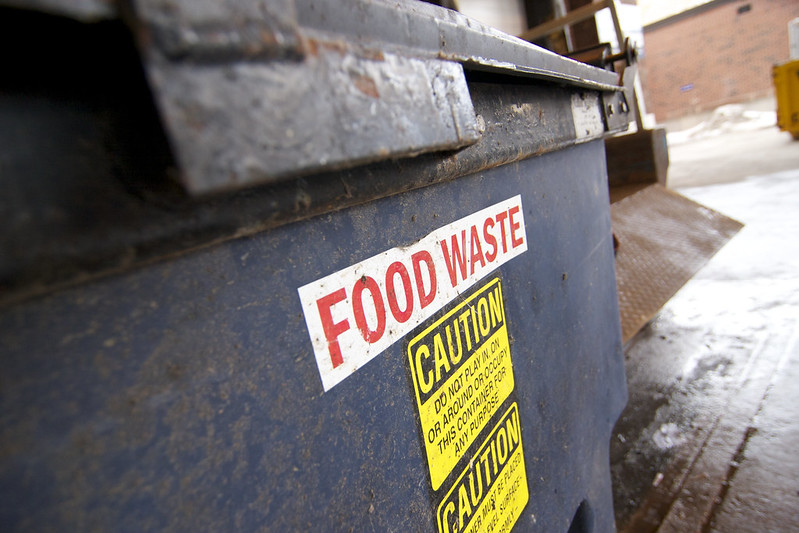Many of us are trying to be more sustainable and “Go Green”. From individual households to large industrial facilities, to sports stadiums, people and companies are making changes to lower their overall impact to the environment. In Minnesota, large public facilities, such as the Minneapolis-St. Paul International Airport and Target Field, have begun composting organic materials as a way to reduce their overall waste disposal. This is largely the result of MN Statute 115A.551, introduced in 2008, which requires that all Minnesota counties work to recycle or compost 75% of their total solid waste by 2030. Each county in Minnesota is responsible to enact policies and procedures to reach this goal. Therefore, in Hennepin County, it is now a requirement for all facilities that generate one ton of waste per week to have organic recycling in place.
Organic materials that are collected at individual facilities, such as food wastes and food serviceware, are sent to source-separated organic matter facilities (SSOMs) for composting. Minnesota currently has nine large-scale SSOMs, and over 100 sites that collect solely yard wastes. Given the types of materials they receive, these facilities are subject to different environmental regulations than traditional landfills. For example, SSOMs are required to collect and treat any water that comes in contact with organic material in the early phases of the compost process, typically, by sending this contact water to a wastewater treatment plant. Water that comes in contact with later-phase composting materials is considered stormwater and managed via a site-specific industrial stormwater permit. On the other hand, yard waste facilities that exclusively accept landscaping debris are not required to collect and treat water that comes in contact with yard waste; instead, these facilities are designed to minimize run-on and run-off.
Regulating PFAS in Compost Contact Water
In March of 2020, the Minnesota Pollution Control Agency (MPCA) published the preliminary findings of a months-long study in which the contact water and stormwater of seven SSOMs and yard waste facilities were measured for perfluoro- and polyfluoroalkyl substances (PFAS) over three separate sampling events. Water samples from each facility were found to have concentrations that exceeded Minnesota Department of Health (MDH) screening criteria for at least one PFAS analyte, most commonly perfluorobutanoic acid (PFBA), perfluorooctanoic acid (PFOA), perfluorohexane sulfonic acid (PFHxS), and perfluorooctane sulfonic acid (PFOS). In particular, PFOS was observed to exceed the non-cancer health-based value (HBV) in the contact water at all seven sites, reaching as high as 7,709 parts per trillion (ppt) at one facility, over 500 times the MDH HBV of 15 ppt for PFOS.
Many compostable food containers are manufactured with some form of a PFAS compound to increase their hydrophobic properties. Nevertheless, there is currently no system for identifying which products are PFAS-free. It is unclear how SSOMs would be able to identify compostable consumer products containing PFAS without extensive testing should they chose to do so.
Minnesota regulators are working to address PFAS in food serviceware and in composting contact water. On February 11, 2020, a separate bill was introduced in the Minnesota House of Representatives that would address this issue. Authored by Representatives Claflin, Becker-Finn, Vang, Morrison and Fischer, HF3180 states that “no person shall manufacture, knowingly sell, offer for sale, distribute for sale, or distribute for use in Minnesota a food package that contains intentionally added PFAS.”
On March 2, 2020, Minnesota State Representatives Josh Heintzeman (R-10A) and Peter Fischer (DFL-43A) introduced bipartisan legislation (HF3970) to address PFAS found in contact water from compost facilities . The proposed bill would require that “until a state or federal statute or rule is enacted that prohibits incorporating (PFAS) into food serviceware or other compostable products, a compost facility may elect not to accept such products for composting.” Additionally, the bill would appropriate funds to monitor groundwater and surface waters near compost facilities.
Additional research will be needed to determine if PFAS is present in the compost material itself, as well as identifying potential PFAS sources at yard waste facilities that presently do not accept the products considered by HF3970 or HF3180. MPCA still recommends people and companies continue composting efforts, leaving industries with a conundrum for increasing their composting efforts while SSOMs could start implementing stricter requirements on what they accept, especially if PFAS regulations and/or additional monitoring are imposed on SSOMs and yard waste facilities. Industries interested in continuing to compost food materials may need to consider formal segregation programs to minimize the introduction of serviceware into their composting waste streams.
For more information on this investigation into PFAS levels at Minnesota composting facilities, visit the link below:




